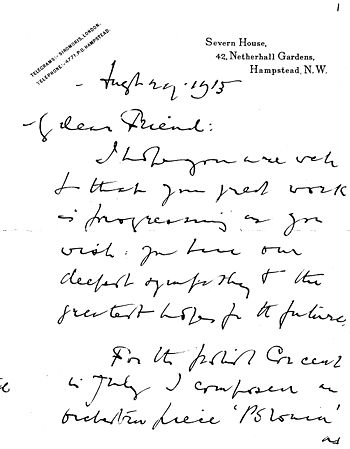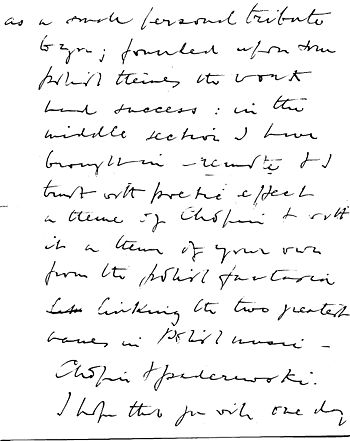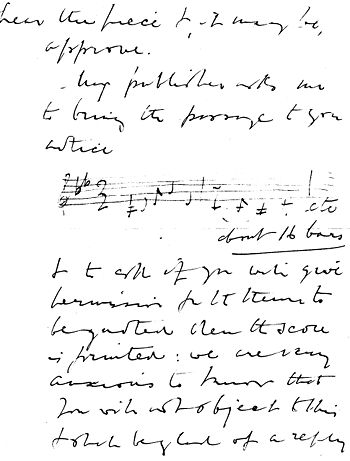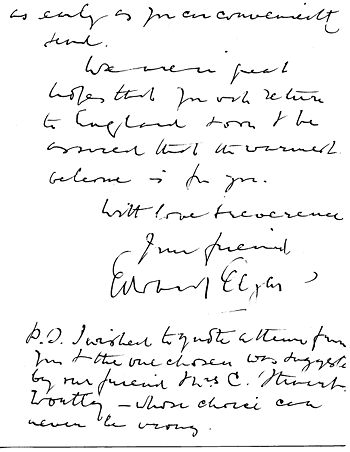.gif)
Polonia (Elgar)
Encyclopedia
Polonia is a symphonic prelude by the English composer Edward Elgar
written in 1915 as his Op. 76.
had been a recent tribute to Belgium
, but this time using Polish national music.
The piece was mainly Elgar's own work, but he included quotations
from the Warszawianka and other Polish patriotic songs, the Polish National Anthem, and themes by Frédéric Chopin
and Ignacy Jan Paderewski
.
It was first performed at the Polish Victims' Relief Fund Concert in the Queen's Hall
, London
on 6 July 1915, with the orchestra conducted by the composer. The Relief Fund was a worldwide effort, organised by Paderewski and Henryk Sienkiewicz
, in aid of refugees from the terrible conflict in Poland
between the forces of Russia
and Germany
. There were elaborately engraved programmes, each tied with a red and white ribbon, containing messages from Paderewski. Elgar conducted his première and Thomas Beecham
conducted the remainder of the concert.
Elgar dedicated Polonia to Paderewski, already a distinguished pianist and composer, and later Prime Minister of Poland.
On 29 August 1915, Elgar wrote to Paderewski, asking for permission for the quotation from his Fantasie Polonaise to be published:
Paderewski received the work with genuine admiration. He wrote to Elgar after hearing the work for a second time in October:
Polish patriotic songs, the Polish National Anthem, and themes by Chopin
and Paderewski
, integrating with them a theme of his own, said to be the motive of his admiration for the Polish people.
The first theme that Elgar uses is heard, after an introductory flourish, played by the bassoon
s. It is a quote from the Warszawianka, which has the words "Śmiało podnieśmy sztandar nasz w górę" ("Bravely let us raise our flag"). This is immediately followed by a Nobilmente theme (Elgar's own), broadly stated then dying away to lead to the second national theme which is the dignified "Chorał" or "Z dymem pożarów" ("With the smoke of fires"), first played simply by the cello
s (with a cor anglais
) and a harp
, later by the woodwind with a violin
countermelody, before being played by the full orchestra. The Warszawianka theme is then developed, leading into a brief return of Elgar's theme, before a quotation from Paderewski's Fantasie Polonaise appears, signalled by the ring of a triangle
. The magical section following quotes from Chopin's Nocturne in G minor, played by a solo violin, during which the Paderewski theme is heard, and is quietly interrupted by the Warszawianka. There is further development which leads to a triumphant return of the Chorale, which sounds like a conclusion to the work, but no: the Chorale dies away, there is a simple statement of the Polish National Anthem "Jeszcze Polska nie zginęła" ("Poland Is Not Yet Lost"), and it is this Anthem which brings the work to a brilliantly orchestrated conclusion. For the final bars, the instruments of the orchestra are joined by the organ
.
Edward Elgar
Sir Edward William Elgar, 1st Baronet OM, GCVO was an English composer, many of whose works have entered the British and international classical concert repertoire. Among his best-known compositions are orchestral works including the Enigma Variations, the Pomp and Circumstance Marches, concertos...
written in 1915 as his Op. 76.
History
On 13 April 1915 the Polish conductor Emil Młynarski asked Elgar to compose something, thinking of how Elgar's CarillonCarillon (Elgar)
”Carillon” is a recitation with orchestral accompaniment written by the English composer Edward Elgar as his Op. 75, in 1914. The words are by the Belgian poet Émile Cammaerts....
had been a recent tribute to Belgium
Belgium
Belgium , officially the Kingdom of Belgium, is a federal state in Western Europe. It is a founding member of the European Union and hosts the EU's headquarters, and those of several other major international organisations such as NATO.Belgium is also a member of, or affiliated to, many...
, but this time using Polish national music.
The piece was mainly Elgar's own work, but he included quotations
Musical quotation
Musical quotation is the practice of directly quoting another work in a new composition. The quotation may be from the same composer's work , or from a different composer's work ....
from the Warszawianka and other Polish patriotic songs, the Polish National Anthem, and themes by Frédéric Chopin
Frédéric Chopin
Frédéric François Chopin was a Polish composer and virtuoso pianist. He is considered one of the great masters of Romantic music and has been called "the poet of the piano"....
and Ignacy Jan Paderewski
Ignacy Jan Paderewski
Ignacy Jan Paderewski GBE was a Polish pianist, composer, diplomat, politician, and the second Prime Minister of the Republic of Poland.-Biography:...
.
It was first performed at the Polish Victims' Relief Fund Concert in the Queen's Hall
Queen's Hall
The Queen's Hall was a concert hall in Langham Place, London, opened in 1893. Designed by the architect T.E. Knightley, it had room for an audience of about 2,500 people. It became London's principal concert venue. From 1895 until 1941, it was the home of the promenade concerts founded by Robert...
, London
London
London is the capital city of :England and the :United Kingdom, the largest metropolitan area in the United Kingdom, and the largest urban zone in the European Union by most measures. Located on the River Thames, London has been a major settlement for two millennia, its history going back to its...
on 6 July 1915, with the orchestra conducted by the composer. The Relief Fund was a worldwide effort, organised by Paderewski and Henryk Sienkiewicz
Henryk Sienkiewicz
Henryk Adam Aleksander Pius Sienkiewicz was a Polish journalist and Nobel Prize-winning novelist. A Polish szlachcic of the Oszyk coat of arms, he was one of the most popular Polish writers at the turn of the 19th and 20th centuries, and received the Nobel Prize in Literature in 1905 for his...
, in aid of refugees from the terrible conflict in Poland
Poland
Poland , officially the Republic of Poland , is a country in Central Europe bordered by Germany to the west; the Czech Republic and Slovakia to the south; Ukraine, Belarus and Lithuania to the east; and the Baltic Sea and Kaliningrad Oblast, a Russian exclave, to the north...
between the forces of Russia
Russia
Russia or , officially known as both Russia and the Russian Federation , is a country in northern Eurasia. It is a federal semi-presidential republic, comprising 83 federal subjects...
and Germany
Germany
Germany , officially the Federal Republic of Germany , is a federal parliamentary republic in Europe. The country consists of 16 states while the capital and largest city is Berlin. Germany covers an area of 357,021 km2 and has a largely temperate seasonal climate...
. There were elaborately engraved programmes, each tied with a red and white ribbon, containing messages from Paderewski. Elgar conducted his première and Thomas Beecham
Thomas Beecham
Sir Thomas Beecham, 2nd Baronet CH was an English conductor and impresario best known for his association with the London Philharmonic and the Royal Philharmonic orchestras. He was also closely associated with the Liverpool Philharmonic and Hallé orchestras...
conducted the remainder of the concert.
Elgar dedicated Polonia to Paderewski, already a distinguished pianist and composer, and later Prime Minister of Poland.
On 29 August 1915, Elgar wrote to Paderewski, asking for permission for the quotation from his Fantasie Polonaise to be published:
 |
 |
 |
 |
Paderewski received the work with genuine admiration. He wrote to Elgar after hearing the work for a second time in October:
Themes
Elgar quotesMusical quotation
Musical quotation is the practice of directly quoting another work in a new composition. The quotation may be from the same composer's work , or from a different composer's work ....
Polish patriotic songs, the Polish National Anthem, and themes by Chopin
Frédéric Chopin
Frédéric François Chopin was a Polish composer and virtuoso pianist. He is considered one of the great masters of Romantic music and has been called "the poet of the piano"....
and Paderewski
Ignacy Jan Paderewski
Ignacy Jan Paderewski GBE was a Polish pianist, composer, diplomat, politician, and the second Prime Minister of the Republic of Poland.-Biography:...
, integrating with them a theme of his own, said to be the motive of his admiration for the Polish people.
The first theme that Elgar uses is heard, after an introductory flourish, played by the bassoon
Bassoon
The bassoon is a woodwind instrument in the double reed family that typically plays music written in the bass and tenor registers, and occasionally higher. Appearing in its modern form in the 19th century, the bassoon figures prominently in orchestral, concert band and chamber music literature...
s. It is a quote from the Warszawianka, which has the words "Śmiało podnieśmy sztandar nasz w górę" ("Bravely let us raise our flag"). This is immediately followed by a Nobilmente theme (Elgar's own), broadly stated then dying away to lead to the second national theme which is the dignified "Chorał" or "Z dymem pożarów" ("With the smoke of fires"), first played simply by the cello
Cello
The cello is a bowed string instrument with four strings tuned in perfect fifths. It is a member of the violin family of musical instruments, which also includes the violin, viola, and double bass. Old forms of the instrument in the Baroque era are baryton and viol .A person who plays a cello is...
s (with a cor anglais
Cor anglais
The cor anglais , or English horn , is a double-reed woodwind instrument in the oboe family....
) and a harp
Harp
The harp is a multi-stringed instrument which has the plane of its strings positioned perpendicularly to the soundboard. Organologically, it is in the general category of chordophones and has its own sub category . All harps have a neck, resonator and strings...
, later by the woodwind with a violin
Violin
The violin is a string instrument, usually with four strings tuned in perfect fifths. It is the smallest, highest-pitched member of the violin family of string instruments, which includes the viola and cello....
countermelody, before being played by the full orchestra. The Warszawianka theme is then developed, leading into a brief return of Elgar's theme, before a quotation from Paderewski's Fantasie Polonaise appears, signalled by the ring of a triangle
Triangle (instrument)
The triangle is an idiophone type of musical instrument in the percussion family. It is a bar of metal, usually steel but sometimes other metals like beryllium copper, bent into a triangle shape. The instrument is usually held by a loop of some form of thread or wire at the top curve...
. The magical section following quotes from Chopin's Nocturne in G minor, played by a solo violin, during which the Paderewski theme is heard, and is quietly interrupted by the Warszawianka. There is further development which leads to a triumphant return of the Chorale, which sounds like a conclusion to the work, but no: the Chorale dies away, there is a simple statement of the Polish National Anthem "Jeszcze Polska nie zginęła" ("Poland Is Not Yet Lost"), and it is this Anthem which brings the work to a brilliantly orchestrated conclusion. For the final bars, the instruments of the orchestra are joined by the organ
Organ (music)
The organ , is a keyboard instrument of one or more divisions, each played with its own keyboard operated either with the hands or with the feet. The organ is a relatively old musical instrument in the Western musical tradition, dating from the time of Ctesibius of Alexandria who is credited with...
.
Recordings
- The Symphony Orchestra conducted by Sir Edward Elgar, recorded 22 May 1919, issued on HMV D493 [matrix HO3726af & HO3728af]; reissued in "The Elgar Edition. The Acoustic HMV Recordings," 1914-25. Pearl CD GEMMCDS9951/5.
- 1975 "Elgar Orchestral Music", London Philharmonic Orchestra conducted by Sir Adrian Boult, includes "Polonia". EMI Records, ASD 3050 stereo.
- Elgar Collector's Edition Modern edition of the same recording - London Philharmonic Orchestra, Sir Adrian Boult.
- Elgar War Music Rutland Sinfonia, Barry Collett.
- British Symphonic Collection Vol 2: Elgar Munich Symphony Orchestra, Douglas Bostock.
- Elgar: Marches New Zealand Symphony Orchestra, James Judd.
- Transcribed for organ played by Simon Nieminski at St Mary's Episcopal Cathedral, Edinburgh.
- Elgar: Violin Concerto (Violin Concerto/ Polonia/ Interlude From The Crown Of India) played by the Royal Scottish National Orchestra conducted by Sir Andrew Davis.

